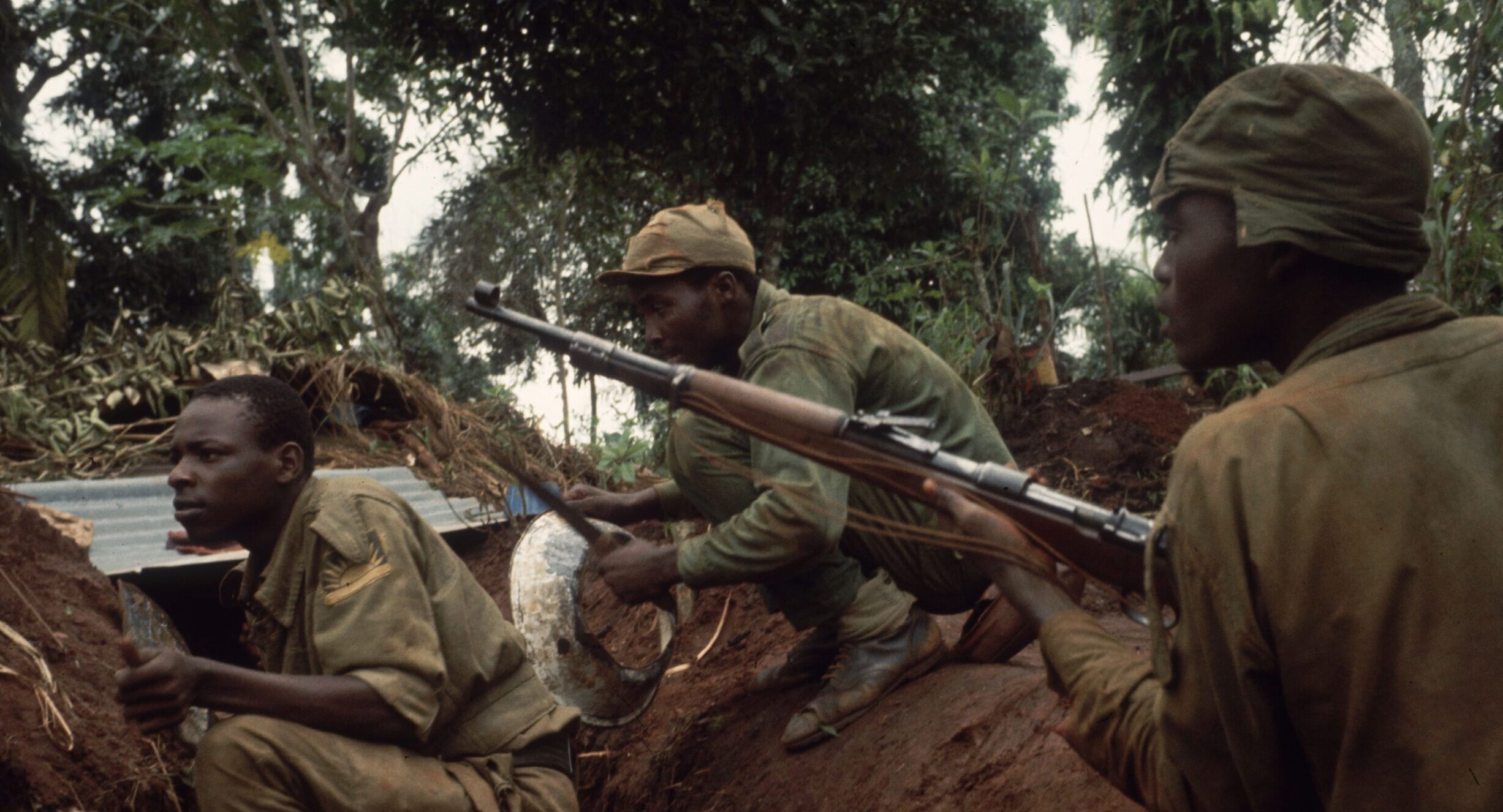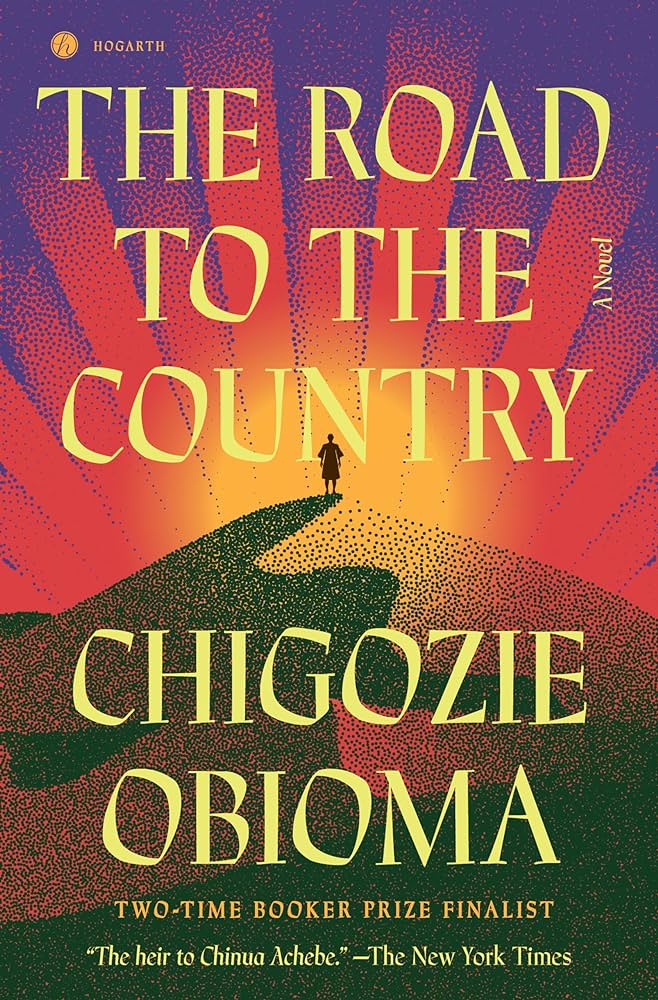One modern view of war teaches that all of it is senseless; in the face of violence and suffering, the only thing one can do is echo the absurdist “Poo-tee-weet” of the birds overlooking fire-bombed Dresden in Kurt Vonnegut’s Slaughterhouse-Five. Yet war has also been hero-making and culture-defining for the individual and society. The Road to the Country, the latest novel from the Nigerian-born American author Chigozie Obioma, portrays war as an opportunity for redemption, a crucible that can transform even as it destroys.
The Road to the Country is set during the 1967–1970 Nigerian Civil War between the Hausa-Fulani tribe in the north (largely Muslim and feudal, with greater control of the centralized government) and the Igbo tribe in the southeast (Christian and democratic, with great economic and entrepreneurial success but little political power). In 1966, certain Igbo leaders launched an unsuccessful coup; in response, Hausa-Fulani mobs killed 8,000–30,000 Igbo. The Igbo fortified themselves in their home region in the southeast and declared their independence as the new nation of Biafra in 1967. Civil war ensued.
Despite a lack of equipment and training, Biafrans maintained the fight for independence for three years before the Nigerian military forced them to surrender and remain a part of Nigeria. Over the war’s course, two million people died, nearly half of whom were Biafran children who starved due to a devastating trade blockade imposed by the Nigerian military. The conflict remains the second bloodiest in African history, and it resulted in no significant changes on the geopolitical stage. The death and destruction wreaked on Nigeria seems the very definition of senseless violence.
The Road to the Country does not shy away from portraying the brutality of war. Far from romanticizing the fight for independence, the book is replete with the bad and the ugly of the struggle: mutilated eyes, the bloodied lips of rigored bodies smiling hauntingly, soldiers relieving themselves in trenches and vomiting when confronted by unexpected danger. One character recalls the sight of her children’s throats cut “like fowl”; another remembers a woman leaping into a collapsing building at the news of her husband’s death.
Yet this novel is no mere catalogue of horrors. It tells the story of a young man named Kunle, a law student in Akure. Kunle has had his head in books for years and barely registers the outbreak of war, despite his city’s proximity to the Biafran border and the fact that he is half-Igbo (his father is from the moderate Yoruba tribe). The narrative remains faithful to Kunle’s perspective (a character-centric method for which Hillsdale College president Larry Arnn has praised Obioma, with whom I studied when he visited the college in 2022).
For Kunle, the war is a chance for redemption. Kunle is suffering from a spiritual crisis: as a child, he neglected his brother, Tunde, resulting in an accident which crippled Tunde for life. The novel reports that “over the years, [Kunle has] come to sense, by some secret law of the soul, that he will someday be called upon to atone for his sin.”
When Kunle learns that Tunde is in Biafra, he ventures across the border to bring his brother home. After losing the Red Cross credentials he used to pass the frontier, Kunle is conscripted into the Biafran army. When the initial shock wears off, he begins to believe that going through the hell of war may be a path to spiritual expiation and that “instead of attaining the redemption he sought for so long in righting the wrong he once did, he could achieve it on a larger scale if he helped fight to save this people.”
In some ways, the war does redeem Kunle. At first timid and introspective, he is taught by the war to be a man of action—and to embrace love when he meets Agnes, a female commander. “The war, it seems,” the narrator tells us, “has remade him into the boy he was before the accident.”
The war is also revelatory: the extreme conditions remove the veil of everyday life which ordinarily conceals the fullness of human depravity. As Kunle’s comrade Bube-Orji remarks, “I was just saying, it is like we come to stand in front of one mirror, you know? The mirror is this war. . . . It’av shown us different pictures of ourselves that we did not know existed.” The consequences of every choice and movement become more obvious and immediate. The war is a true “apocalypse” in the etymological sense—an unveiling.
Revelatory experiences persist throughout. The otherwise straightforward storyline is framed by short chapters describing the mystical visions of a “Seer” named Igbala, who in 1947 predicted the Civil War, including every detail of Kunle’s life before Kunle was born. Igbala foresees that Kunle will be an “abami eda”—one who will die and return to life. Indeed, at the midpoint of the novel, Kunle is struck by shrapnel and dies. For twenty-six pages, Kunle roams about the “endless fields” of the dead, speaking with deceased soldiers from Biafra and around the world. Upon learning that Kunle is “not dead,” the others urge him to walk down a path back to the living—the “road to the country”—and not look back.
Like the prophet of the Book of Revelation, Igbala sees a future of societal decimation and death, and he sees the roots of the crisis spreading in his own time. He warns that the distance between his own hour of prophecy and the war that will reveal the gravity of every choice is “hymen thin,” perhaps invoking the marital imagery of the consummation of time in the Book of Revelation. The book ends with the frightening observation that the depravity which can lead to the death of millions is present even in moments of peace—a veiled presence too often ignored:
Lost in the thrill of [life], most people will not look beneath its surface. Even the curious who do look will not see the grave thing that has descended among them, biding its time. Every day the fearful stream will continue its interminable flow, bearing within it the terrible secret vision, so that when the day to be feared arrives it will be as though a thing unwelcome has entered the midst of an unsuspecting gathering—unseen. And, as such, it will be too late to stop it.
The Road to the Country by no means downplays the intense suffering of war, both for combatants and civilians. There is no silver lining: when Kunle hears Biafra has surrendered, he is with his parents. He breaks down and, clinging to his mother’s legs, begins “wailing, trying as much as he can to muster the words that linger in his mind: that he is sorry for it all.”
Whatever good things have come through the war—Kunle’s eventual reconciliation with his brother, the birth of Kunle’s newborn child with Agnes—have not been sufficient to justify it. Yet if Kunle had remained a self-absorbed law student in Akure, he may never have been pushed to such lengths to find his brother and to restore his relationship with him; without the war, he never would have met his wife. These things bring meaning, if not parity; they are “like mushrooms growing from the rotting corpses of youthful men.” Though they grow out of grave circumstances, they are life.















